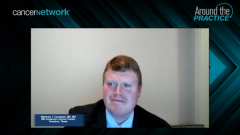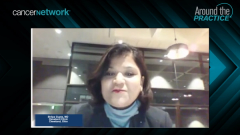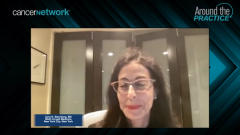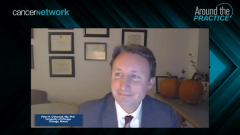
mUC: Duration of Maintenance Avelumab and Treatment at Progression
Focused discussion on the duration of maintenance avelumab for metastatic urothelial carcinoma and considerations for switching therapy.
Episodes in this series

Transcript:
Peter H. O’Donnell, MD, PhD: We’re going to do the next audience poll question, which is question No. 6. We talked a little about this with the panelists earlier: how long do you do maintenance? Is it a fixed period of time? Dr Campbell was talking about 2 years as possibly a landmark. Or do you give it indefinitely until the patient progresses or has unacceptable toxicity? One or the other for the audience.
We’re getting responses coming in. Very interesting. We’re getting pretty close to 50/50 for folks saying they use it for some set period of time vs indefinitely. We also saw that in some of the comments of the panelists. Just to put a bow on this question, Cora, do you have a response to how the audience feels about this question?
Cora N. Sternberg, MD: The audience is responding from their hearts because they don’t really know and we don’t know. The study was designed to continue until patients progressed. That’s the way the study was designed. Having said that, if you have a patient who’s been on management for 2 years in CR [complete response] and they’re sick and tired of coming in every 2 weeks I don’t really think there’s anything wrong with stopping and seeing what happens. We don’t know that from the study. That’s clinical practice and what we’ll decide to do.
Peter H. O’Donnell, MD, PhD: I’ve got 2 more questions before we move on from this maintenance debate. Shilpa, I’ll ask you. If a patient progressed on the maintenance avelumab, so they’re on avelumab—say, for 9 months—and then the scan shows disease progression; would you think that immunotherapy is out as a future option, or would you ever go back to treating that patient with different immunotherapy? Could they get pembrolizumab, for example?
Shilpa Gupta, MD: That’s a great question, but we don’t know the answer. If they’ve been on avelumab and progressed, I wouldn’t be keen to switch the immunotherapy agent and would rather use an antibody-drug conjugant like enfortumab vedotin. There are several trials going on about rechallenging the immunotherapy and another combination after they progress. We’ll learn from those studies, but I usually don’t switch immunotherapy agents.
Peter H. O’Donnell, MD, PhD: Great. Matthew, do you want to comment? Do you feel differently?
Matthew T. Campbell, MD, MS: I feel the same. I hope we’re going to try to answer that question. This landscape is changing so quickly. Some of the clinical trials that get started in this space are going to be hard to potentially get the readout on while everything is changing in the client setting. I completely agree. If you progress on avelumab, it’s probably not a strong move, to move back to a single-agent like PP1 or PD-L1.
Peter H. O’Donnell, MD, PhD: Yes, we’ve got all these other drugs that we get to introduce.
Transcript edited for clarity.
Newsletter
Stay up to date on recent advances in the multidisciplinary approach to cancer.










































